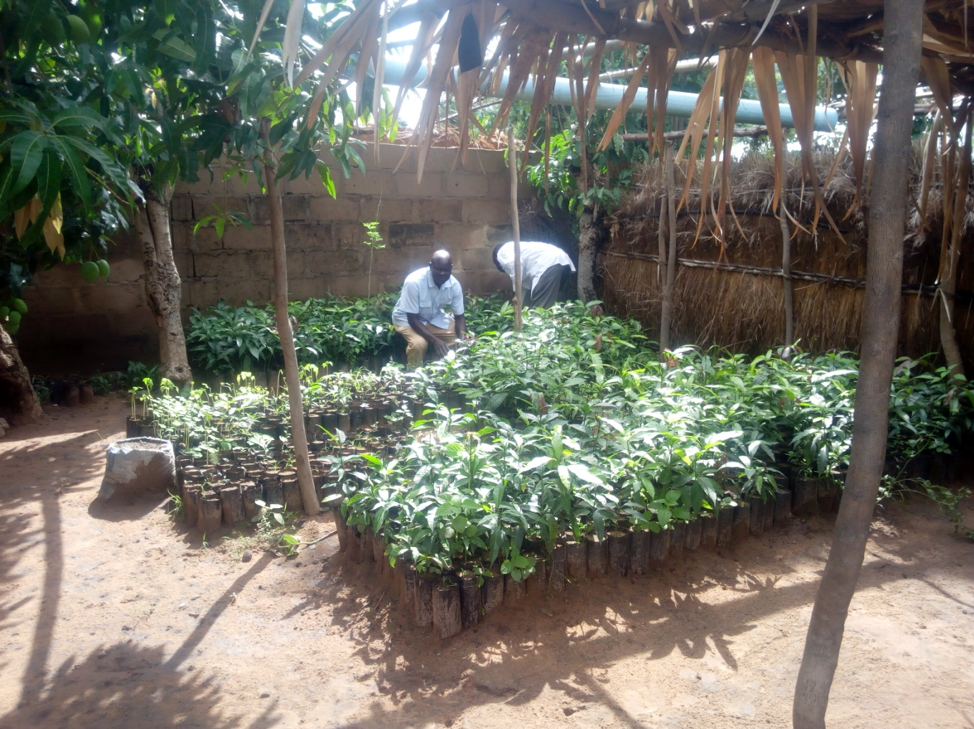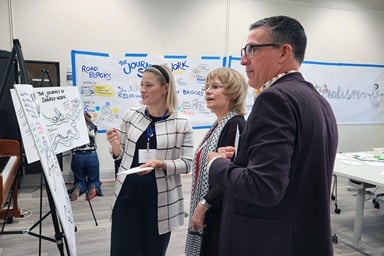
Mary Jonathan plants an orange tree at a United Methodist orphanage in Jalingo, Nigeria, with the anticipation that the fruit will supplement diets in the future. Photo by Sharon Adamu Bambuka, UMNS.
In Nigeria, where the high rate of deforestation is leading to habitat loss, species extinction and soil degradation, United Methodists are hoping that 20,000 trees will make a difference.
So far, the church has planted trees in five communities in the Southern Nigeria Conference. The acacia, eucalyptus, guava, iroko, mahogany, mango, orange and papaya trees are expected to protect degraded environments, safeguard habitats and enhance rural livelihoods.
Climate change starts a cycle of extreme heat, endangering human health and killing livestock. Local streams disappear. As the duration of dry and rainy seasons changes, traditional planting times become less reliable and crop yields suffer.
Charity Aweh lives in Bakin Dutse, a village in which 5,000 trees were planted. Expressing gratitude, she said The United Methodist Church would benefit “if they continue to take good care of the young trees,” adding that “at the end, they will be the ones to enjoy the fruits.”
“Forest covers one-third of the earth’s landmass,” noted Nelson Andrew, an active United Methodist and government agricultural technology officer. He pointed out that indigenous people depend on forests for food, shelter, livelihood, medicine and tools.
Tanko Labuje, a well-digger, said everyone witnesses the consequences when all across Taraba state, the water level drops and wells became dry.
Trees furnish humanity with two of life’s essentials, food and oxygen. They reduce desertification and other forms of climate change. Healthy trees beautify surroundings, conserve energy, create economic opportunities, prevent soil erosion and purify the air.

David Villapah, director of the Agricultural Development Project, plants a eucalyptus tree during a tree-planting campaign at the Mayo-Dassa settlement in Jalingo, Nigeria. This project will preserve soil, improve air and support wildlife. Photo by Sharon Adamu Bambuka, UMNS.
David Villapah directs the conference’s Agricultural Development Project, supported by gifts through the church’s Advance and by the German United Methodist World Mission. He cautioned Nigerians to be aware of the reality of climate change occasioned by massive cutting of trees for domestic and commercial purposes.
“We must discourage the cutting down of trees without replacement,” said United Methodist and government agricultural consultant Daniel Bulus. People must not only plant trees, he explained. They also must protect them.
Adamu Bambuka is director of communications for the Southern Nigeria Annual Conference. News media contact: Vicki Brown, news editor, [email protected] or 615-742-5469. To read more United Methodist news, subscribe to the free Daily or Weekly Digests.
Like what you're reading? Support the ministry of UM News! Your support ensures the latest denominational news, dynamic stories and informative articles will continue to connect our global community. Make a tax-deductible donation at ResourceUMC.org/GiveUMCom.




